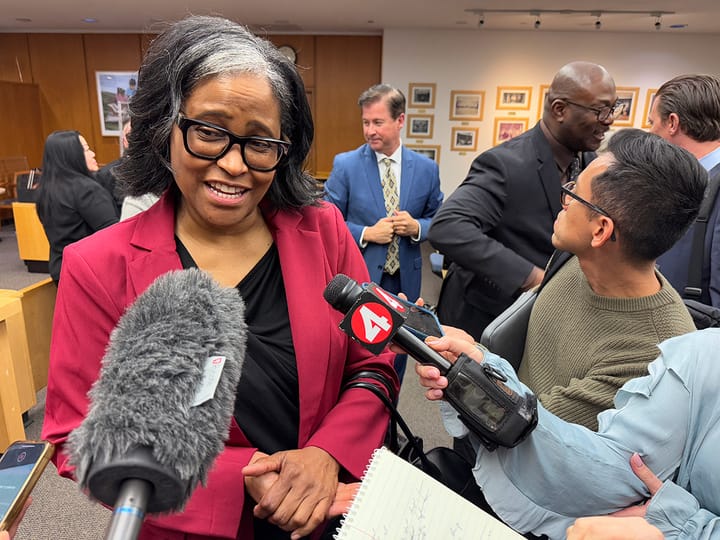DA asks to delay key hearing for OPD detective charged with perjury, bribery of witness
After the hearing, a judge is set to decide whether to dismiss the case against Phong Tran or order him to stand trial.

The Alameda County district attorney's office has asked the court to postpone a critical hearing for a veteran Oakland police detective facing perjury and witness bribery charges.
Last week, the DA's office asked to delay the preliminary hearing for OPD homicide Detective Phong Tran, citing the absence of an office investigator who was expected to testify. The hearing is scheduled to begin Monday morning.
Tran's attorney, Andrew Ganz of Rains Lucia Stern St. Phalle & Silver, has opposed the DA's request. Ganz has argued that the DA's office has not met the legal burden required to put off the hearing for his client, who has maintained his innocence and invoked his right to a speedy process.
"There is no basis for the charges," Ganz wrote in an opposition motion Friday. "We believe they are not prepared to prove them."
The hearing is important because, at the end of it, a judge will decide whether to dismiss the case or order Tran to stand trial.
Don't miss the daily headlines.
The Alameda County DA's office charged Tran in April with perjury and bribery in connection with an Oakland murder case from 2011.
Convictions in the case were vacated last year after serious evidentiary problems came to light with the key witness.
DA Pamela Price has alleged that Tran lied on the stand in 2014 and 2016, saying he did not know a key witness prior to the investigation when he actually did.
The woman originally claimed to have seen the murder and testified about it — but recanted many years later and said she made up the story to get help with housing and other financial needs, according to the National Registry of Exonerations.
The case will come down, in part, to whether the prosecution can prove Tran knew the witness was lying or directed her to do so, or whether she did it on her own.
Tran also was charged with subornation of perjury in 2013 and the attempted bribery of a different witness in the murder case in 2012.
That witness was a driver who was at 46th and Market streets after the shooting and saw "a young man run in front of her car," according to the National Registry of Exonerations.
The driver told police she did not see the man's face. (She never identified anyone.)
But she said she "felt pressure" to make an identification because Tran was "persistent" and "offered to help her son, who was in jail at the time."
When Price announced criminal charges against Tran in April, she said her office would also review "at least 125 cases" he investigated. The Northern California Innocence Project also signed on to help.
"When the integrity of a conviction is at issue in one case, it raises questions in every other case that officer has investigated," DA Price said in a prepared statement in April. "The people of Alameda County need to have confidence in the criminal justice system, and these charges are a step forward toward regaining that trust."
In his motion, Ganz argued that Price filed charges against Tran "without evidence of any crime" and then made "completely inaccurate public statements" about the facts of the case when she described it to the community.
Prosecution says key witness is unavailable
Defendants in California have the right to a preliminary hearing within 60 days of being charged with a crime.
The preliminary hearing, also called a prelim or a "px," is often described as a mini-trial: The prosecution puts on a portion of its evidence and a judge must decide (1) whether a crime may have occurred and (2) whether the accused may have done it.
The standard of proof is much lower than at trial, so attorneys don't present all their evidence. They generally put on just enough to meet the standard of probable cause.
In complex cases, defendants often waive time, such that the prelim may not happen for a year or longer.
That's not what happened in the Phong Tran case: In April when he was charged, Tran invoked his right to a speedy prelim and the hearing was scheduled for Monday, June 12.
Last week, on June 5, the DA's office filed a one-paragraph motion asking for a continuance in the case.
The motion included a four-sentence declaration by Deputy District Attorney Zachary Linowitz, who is assigned to the case, outlining the reasons he needed to delay the proceedings until Friday, June 16.
That would still be within the 60-day window but would be unusual, as most Alameda County courtrooms go dark and do not hold hearings on Fridays.
In his declaration, Linowitz wrote that "DA Inspector Michael Brown, a necessary and material witness, is out of town and unavailable to testify on the date currently scheduled."
No additional details about the need to postpone were provided.
Defense says witness is "irrelevant" to Phong Tran prelim
In his opposition motion, Ganz wrote that, as far as he knew, Brown had no involvement in the case until early June, more than a month after charges were filed.
He wrote that Brown was interviewed at that time by Andrew Koltuniak, the Alameda County district attorney's office inspector assigned to the case, on June 1 and June 2.
"The conversation centered around the service of subpoenas on witnesses for the underlying homicide preliminary hearing back in 2014," Ganz wrote.
The prosecution must establish "good cause" for a continuance and must back up its assertion with "specific facts" showing why a delay is necessary, he argued.
Ganz wrote that subpoenas from 2014 were not central to the case at hand and that, if they were important, another officer could easily testify about them during the prelim, which Koltuniak himself had referenced during the interviews, Ganz argued.
"The People's Motion to Continue must be denied because the testimony from Inspector Brown is irrelevant, likely inadmissible, certainly not material or necessary," Ganz wrote, "and even if it was, [it] can be and was intended to be introduced through another witness."
Detective and witness offer conflicting accounts
The Alameda County district attorney's office began reviewing the Oakland murder case after an attorney filed a writ of habeas corpus in 2021 on behalf of one of two defendants who were convicted of killing 23-year-old Charles Butler Jr. at 10:30 a.m. on Dec. 22, 2011, according to the National Registry of Exonerations.
In his writ, that attorney wrote that key witness Aisha Weber — who had identified the men in a photo lineup — later "recanted her trial testimony and admitted that she had not witnessed the shooting."
She also claimed in a sworn statement that Tran "paid her as much as $30,000 for testifying," according to the National Registry.
Weber's claims are in stark contrast to Tran's description of events.
In 2022, Tran filed his own sworn declaration, The Mercury News reported last week, and estimated that he had paid Weber "between $1,500 and $2,000," most of it after the trial. He also loaned her "several hundred dollars to recover an impounded car."
"This was not done in exchange for her providing information," Tran wrote. He also secured a $1,000 award for the woman through Crime Stoppers, a program that provides money for tips that lead to convictions.
In September 2022, the Alameda County DA's office — then under DA Nancy O'Malley — vacated the convictions for both men identified by Weber, Giovante Douglas and Cartier Hunter.
They were ultimately released from prison after serving more than nine years.
Civil case against Phong Tran, OPD just filed
Last week, Pointer & Buelna, LLP filed a federal lawsuit on behalf of both men against Tran and the Oakland Police Department.
"No physical or forensic evidence ever incriminated Mr. Douglas or Mr. Hunter," attorneys wrote in the filing. "As Mr. Douglas and Mr. Hunter have steadfastly maintained their innocence, no statements incriminated them either."
According to the lawsuit, Tran testified in 2016 that he had met Weber in 2013 when she walked into OPD.
In his 2022 sworn statement, however, he said he met her in 2011 after she had been shot in Oakland.
"Weber did not want to be a CI [confidential informant]," Tran wrote, "but she was interested in passing on information about dangerous people."
Pointer & Buelna allege that Weber was actually an informant prior to identifying the men and that this was never disclosed to the defense or jury during the trial.
Phong Tran prelim set for Monday, June 12
On Monday morning, Tran is set to appear in court for his preliminary hearing and a judge is slated to review the motions filed by each side and decide how to proceed.
It's possible the prelim could begin on time or that another court date could be set for the motions.
Ganz, in his filing, said Tran is "eagerly seeking to clear his name."
"Phong Tran and his reputation have suffered extreme and undue harm," Ganz wrote. "The District Attorney is attempting to buy more time in a transparent attempt to cobble together the semblance of a case."
As of Friday, according to a person familiar with the situation, the DA's office had issued no subpoenas in connection with the case.
New unit has filed charges against several officers
The Tran case is among several prosecutions DA Pamela Price has launched against law enforcement officers since taking office in January.
That month, she announced the creation of a Public Accountability Unit "tasked with holding law enforcement and public officials accountable for misconduct."
At the time, she said she had "asked several local police chiefs and Alameda County Sheriff Yesenia Sanchez to return evidence for eight officer-involved shootings and in-custody deaths, with the intention of reopening the cases for further review to determine whether charges should be filed."
No charges have been announced in those cases.
But, on May 26, Price reported criminal charges against three Alameda County law enforcement officers: two sheriff's deputies she says failed to check on an at-risk inmate who committed suicide, then falsified records about it; and a longtime Probation Department institutional officer who is alleged to have committed two felony sex crimes against a teenage boy when he was in custody as a juvenile from 2004-05.
The Berkeley Scanner will continue to follow the story.




